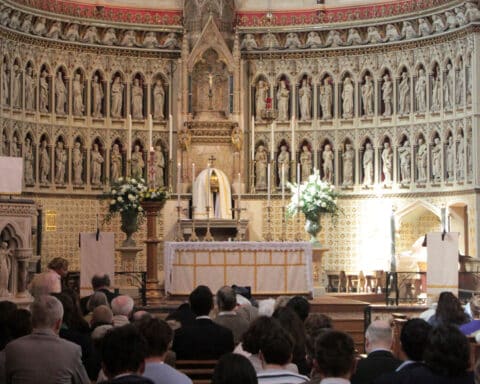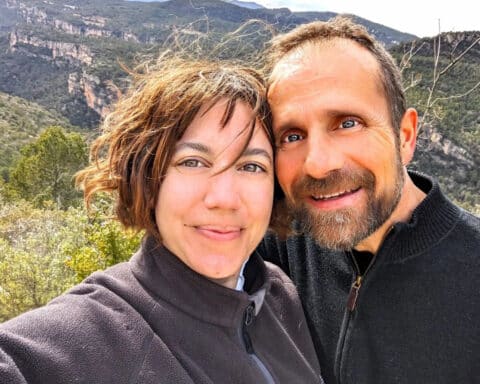Most adults under 45 years old in the United States — nearly 60% — have cohabitated outside of marriage at some point in their lives, according to a recent Pew Research Center survey.
Even more eye-opening is that 74% of Catholics surveyed believe it’s acceptable for an unmarried couple to live together, which the Pew study noted is a higher approval rate than the 47% of black Protestants and 35% of white evangelicals who share that view.
“First, (the Pew study) confirms the progressive demise of a marriage culture in the United States, and that Catholics in this area, as in others, are conforming to the dominant cultural trends of our time,” said Dominic Lombardi, executive director of the U.S. Conference of Catholic Bishops’ Secretariat of Laity, Marriage, Family Life and Youth.
Lombardi told Our Sunday Visitor that at the root of the “crisis” pertaining to the normalization of cohabitation, which correlates to declining rates of sacramental marriages in the Church, is “a loss of the lived truth of the dignity of the human person,” who as male and female are created in God’s image, and who through marriage become an icon of the Trinity and a sacrament of Christ’s union with the Church.
“The bright spot is the Church’s recognition of this crisis,” Lombardi said, “and through its ministers and pastoral agents, [who] are engaging young people and couples, accompanying them, and giving witness and support to them at the personal level.”
Ministry challenges
With few exceptions, most engaged couples in Catholic marriage-preparation programs are sexually active, and many of them live together. That reality presents some real challenges for pastors, mentor couples and others who are tasked with preparing couples for marriage.
“The Pew study is not surprising, but it is like a reality check for us,” said Peg Hensler, associate director of Marriage Ministries and natural family planning for the Diocese of Trenton, New Jersey. Hensler told OSV that several years ago only a few cohabitating couples in her marriage preparation program would admit to living together.
“There was a sense of shame. Now there’s a sense that it’s not a problem at all,” said Hensler, who finds that many cohabitating couples are barely catechized and do not understand the Church’s teachings on chastity and married love.
“They’re surprised when the priest or deacon says anything about it to them,” Hensler said. “They’re like, ‘What do you mean? Everyone lives together first.'”
The Pew study, released Nov. 6, underscores how common cohabitation has become and how it is now seen as a discerning step toward marriage. In the culture, it has become expected that a young couple will move in together to see if they can later live as a married couple.
“Parents for the most part support their kids cohabitating,” said Mary-Rose Verret, who co-founded Witness to Love, a marriage preparation and renewal ministry. Verret described being in a room once where a parent told their adult daughter to move in with her fiance.
“They were saying: ‘We are not paying for the wedding unless you can live with him for five years. I am not spending money and then wasting it,'” said Verret, who told Our Sunday Visitor that other engaged couples will otherwise “hear crickets” from parents and loved ones about cohabitation.
Verrett said the Church needs to come up with creative and effective solutions where pastors and mentors form relationships with engaged couples, accompanying them in a nonjudgmental manner while introducing them to the Church’s teachings and challenging them in a compelling and loving way.
“If we explain things logically and lovingly to couples, I think it would make a little more sense to them, but we as a Church just haven’t really done that yet,” said Verret, who added that just giving an engaged couple a book or a CD on chastity is “never going to be effective.”
Taking marriage seriously
Jason Evert, a Catholic author and chastity speaker, agreed, telling Our Sunday Visitor that the most effective marriage preparation begins at home, where the truths of chastity and married love are taught long before the engaged couples approach the Church for marriage.
“What happens in the nine months preceding the wedding date, to me that’s not marriage prep; that’s triage,” Evert said. “That’s a last-ditch effort to evangelize people who may not have come to a church since their first Communion.”
Evert and others who work in marriage preparation ministry told OSV that cohabitating couples live together not because they don’t take marriage seriously, but because they do. Many of them grew up in divorced households, and they do not want that for themselves.
“So instead of deciding into marriage, they’re sliding into marriage,” Evert said. “They want to dip their toes in the water first, to make sure it’s safe before they go all-in just because they don’t want to go through what their parents went through.”
That thinking is reflected in the Pew survey, where roughly half of respondents (48%) said they believe that couples who live together have a better chance of having a successful marriage.
The challenge, Evert said, is for the Church to convince engaged couples that there is a better way to secure the future of their marriage than moving in together.
“We need to equip them with tools to have confidence in how to build a healthy, lasting marriage instead of thinking that you need to test-drive it beforehand,” Evert said. “You can’t test-drive something that by its very nature is permanent.”
Christian Meert, the cofounder of CatholicMarriagePrep.com, which offers online Catholic marriage preparation classes for Agape Catholic Ministries, told Our Sunday Visitor that he has also found that “the vast majority” of engaged couples have never completely heard the Church’s teachings on chastity.
“When the teachings of the Church are presented in a giving way, in a way that touches their heart, then they are ready to change their minds,” said Meert, who is also the director of the Office of Marriage and Family Life in the Diocese of Colorado Springs, Colorado.
But communicating those teachings effectively requires more than mandatory attendance at a one-day marriage preparation program or even an Engaged Encounter weekend. “Lecturing at them doesn’t work, and showing them a video won’t work,” Meert said.
What will often work is someone who shows the engaged couples that they genuinely care. Lombardi, from the U.S. bishops’ conference, said the Church in the United States is proposing the catechumenate model of guided formation and discipleship as a preferred forum for marriage preparation.
Said Lombardi, “Couples who are evangelized by this experience of their relationship in the Church and the mission of marriage are the seeds sown for the renewal of marriage and family.”
Brian Fraga is a contributing editor for Our Sunday Visitor.





